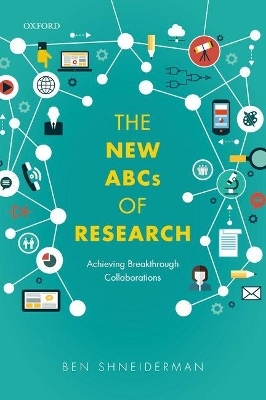
The New ABCs of Research
Oxford University Press (Verlag)
978-0-19-881217-3 (ISBN)
The problems we face in the 21st century require innovative thinking from all of us. Be it students, academics, business researchers of government policy makers. Hopes for improving our healthcare, food supply, community safety and environmental sustainability depend on the pervasive application of research solutions.
The research heroes who take on the immense problems of our time face bigger than ever challenges, but if they adopt potent guiding principles and effective research lifecycle strategies, they can produce the advances that will enhance the lives of many people. These inspirational research leaders will break free from traditional thinking, disciplinary boundaries, and narrow aspirations. They will be bold innovators and engaged collaborators, who are ready to lead, yet open to new ideas, self-confident, yet empathetic to others.
In this book, Ben Shneiderman recognizes the unbounded nature of human creativity, the multiplicative power of teamwork, and the catalytic effects of innovation. He reports on the growing number of initiatives to promote more integrated approaches to research so as to promote the expansion of these efforts. It is meant as a guide to students and junior researchers, as well as a manifesto for senior researchers and policy makers, challenging widely-held beliefs about how applied innovations evolve and how basic breakthroughs are made, and helping to plot the course towards tomorrow's great advancements.
Ben Shneiderman, University Professor, University of Maryland Ben Shneiderman is a Distinguished University Professor in the Department of Computer Science and Founding Director (1983-2000) of the Human-Computer Interaction Laboratory at the University of Maryland. His development of user interfaces such as the highlighted clickable link for the web, small touchscreen keyboards, and information visualization concepts earned him membership in the National Academy of Engineering.
Guiding Principles
1: Combining Applied and Basic Research: ABC Principle
2: Blending Science, Engineering, and Design: SED Principle Blending
Science, Engineering & Design
3: What Science Contributes: Persistence in Understanding the World
4: What Engineering Contributes: Devotion to Focused Innovations
5: What Design Contributes: Fresh Thinking to Serve Human Needs
Research Lifecycle Strategies
6: Choose Actionable Problems that Address Civic, Business & Global Priorities
7: Apply Observation, Intervention, and Controlled Experiments
8: Form Teams with Diverse Individuals & Organizations
9: Test Ideas and Prototypes with Realistic Interventions
10: Promote Adoption & Assess Impact
Making it Happen
11: Why change is hard, but possible
12: Recommendations for action
| Erscheinungsdatum | 22.11.2017 |
|---|---|
| Verlagsort | Oxford |
| Sprache | englisch |
| Maße | 158 x 235 mm |
| Gewicht | 582 g |
| Themenwelt | Geschichte ► Teilgebiete der Geschichte ► Technikgeschichte |
| Medizin / Pharmazie | |
| Naturwissenschaften | |
| ISBN-10 | 0-19-881217-5 / 0198812175 |
| ISBN-13 | 978-0-19-881217-3 / 9780198812173 |
| Zustand | Neuware |
| Informationen gemäß Produktsicherheitsverordnung (GPSR) | |
| Haben Sie eine Frage zum Produkt? |
aus dem Bereich


